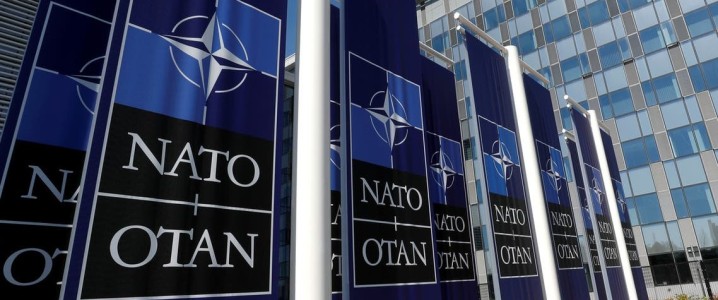The northern European countries are currently embroiled in a Russian hybrid warfare attempt, a situation that demands immediate and decisive attention. Denmark, a member of both the EU and NATO, is set to host a European Union Summit in Copenhagen this week, with the primary focus on Russian aggression in Ukraine and its hybrid warfare tactics. The Danish transportation ministry has already taken steps to ban all civilian drone flights in Danish airspace, underscoring the urgency of the security situation. Norwegian, Swedish, Finnish, and other Baltic Sea region countries are currently under threat from drone attacks linked to the Russian naval presence in the region, or originating from Russian or dark fleet vessels.
The current crisis has again pushed EU and NATO members to reassess options to counter these developments, including a complete blockade of the seas for Russian assets. Current EU, UK, and US sanctions on Russia are already impacting Putin’s revenues, but Moscow still holds access to the seas, particularly Baltic outlets. Growing calls are being heard for a blockade of the Baltic Sea and its gateways, seen as a measure that could hurt Putin severely. The options are on the table; however, the risks and rewards remain unclear. What is clear, however, is the need for a coordinated EU/NATO response.
The Baltic Sea and its gateways—including the Skagerrak, Kattegat, Danish Straits, and Øresund—are not only narrow waterways but also vital maritime arteries for commerce, energy, and communication. These routes connect Northern and Central Europe to global markets, making them strategically important. The growing threat of Russian interference in these areas is a cause for concern.
Since Russia’s invasion of Ukraine, the Baltic Sea has been contested—not primarily militarily but through ageing “shadow” tankers, suspicious anchor-dragging incidents severing subsea cables, and repeated drone and airspace probes. Moscow’s hybrid warfare also involves associated actors, as evidenced by reports of Chinese vessel operations. The threats are real and increasing, but options to counter them have been limited until now. Western politicians and military leaders are examining possible NATO and EU coastal state actions to block Russian dark fleet movements in the Baltic. Such steps could profoundly affect Russia’s revenues, NATO’s risk calculus, and global oil markets.
Lawful measures to block Russian access exist but have not yet been implemented. European coastal states could establish port denials, targeted sanctions, insurance and financial interdictions, and naval patrols under clear legal mandates—options that may now be discussed in Copenhagen. Grey-zone measures, such as persistent interdiction of ship-to-ship transfers and denial of bunkering and port services, should also be considered. Some are even discussing kinetic interdiction (seizing or sinking vessels), but this remains too far-fetched for many NATO members. The UNCLOS rules have until now prevented such measures, as kinetic action in peacetime against broadly flagged merchant tonnage carries a high risk of legal breach and escalation. Still, hybrid warfare may soon push some toward black ops strategies. To be effective, the Copenhagen Summit should adopt a layered civil-military strategy leveraging peacetime authorities such as customs, port-state control, sanctions enforcement, insurance leverage, naval presence, and monitoring.
Global oil markets, already volatile, could face sharp disruptions if Baltic access is denied. The region hosts key Russian export nodes for crude and petroleum products, and also serves as a hub for ship-to-ship logistics and dark fleet operations. Coordinated denial strategies among Baltic states, combined with insurer participation, would raise Russia’s operational costs. Port denials, STS policing, and insurance withdrawals would increase transport costs and logistical friction as dark fleet tankers reroute and pay higher premiums. This would reduce Russia’s market access and force heavier discounts on its barrels. While Russia has alternative routes (Arctic, Black Sea), these are unattractive in winter or vulnerable to Ukrainian attacks.
The effects are not yet clear but warrant close assessment. If interdiction is implemented without kinetic escalation, the likely consequences include higher freight rates and insurance premiums in the Baltic, as well as regional price spikes for refined products such as diesel and heating oil due to supply chain reconfiguration. The most significant impact will be pressure on Russian fiscal receipts as throughput and netbacks fall. In the long term, markets may adapt through rerouting to Asia, but the real impact will depend on the duration and scope of EU/NATO measures. Baltic denial would mainly affect Russia’s western ports, such as Primorsk and Ust-Luga, which handle crude and refined exports for Europe and beyond. The greatest pressure on Russia will come if such measures are sustained over time.
Ultimately, Russia’s hybrid warfare and its revenue base must be targeted. A new, more proactive denial strategy in the Baltic, combined with Ukraine’s drone and missile strikes on Russian energy infrastructure, could deal a serious blow. Oil markets must factor not only supply–demand fundamentals but also the strategic decisions of European leaders and military actions on the ground.
By Cyril Widdershoven for Oilprice.com
More Top Reads From Oilprice.com
